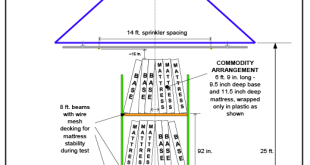Know the Details About Your Insurance Coverage
Once, the question “Am I covered?” was very easy to answer, but it has now become a complicated issue. Gone are the days of very broad policies. You must be very careful in what you purchase. Today’s policies have more exclusions and limitations than ever before. Some exclusions and limitations are built into the policy forms and not separate identifiable endorsements. You must do your due diligence to understand what you are purchasing and know if it fits your needs.
Not every sprinkler contractor is the same, and many have their own niche or territory in which they specialize. I have seen exclusions for residential work, subcontractor warranty, height limitations, territory exclusions, and the list goes on. A poorly worded subcontractor warranty in a policy can leave you with no coverage if you do not follow the strict requirements of their policy for the coverage to remain in effect. This may include the use of the right risk transfer agreement and making sure the subcontractor has the proper insurance. Many of these restrictions can cause a default in your contractual obligations to the project owner and prevent you from getting paid.
In New York, labor law has always been a big issue. Many GL policies will exclude injury to employees or your sub’s employees that could leave you with no coverage. In cases where an employee or sub’s employee sues a building owner or general contractor, and if you signed a hold harmless/indemnity agreement with either of those parties, this could leave you without coverage if you have a labor law exclusion.
Some policies have classification limits, meaning it may only cover the classes that are listed in the policy, and anything outside of those classes is not covered. There are niche insurance programs that write fire sprinkler contractors, but many of them don’t want plumbers. Just as there are many plumbing programs that won’t write fire sprinkler contractors. Finding a niche program may include some nice throw-in coverages for design work, inspections, or testing. Otherwise, a separate policy may be needed for errors and omission coverage. In addition, separate policies may also be needed for mold, employment practices, and cyber liability coverage. Cyber coverage is also a hot topic due to data breaches, system hacking, and ransomware extortion. With many people now working from home, carriers are now looking for Multifactor Authentication to enhance your cyber security.
It’s also important to make sure that whatever you are purchasing matches up with the requirements of the general contractor. You don’t want to run into any issues at the end of the job when it’s time to get paid, and now they’re looking for additional coverage from you.
Insurance has gotten very expensive. Sometimes, the required limits can be negotiated with your general contractor. It may be out of their control as well, as they may also have subcontractor requirements on their policy that spell out what their subs are required to carry for the general contractor’s coverage to be in effect.
As you have probably seen, when it comes to installing fire sprinklers, not everyone may be on top of their game, as are members of the associations who take the time to learn about their trade. The same goes for insurance brokers. Make sure you find someone who understands your business and is familiar with the insurance marketplace that specializes in fire sprinklers. Knowing what to ask from the carriers and the insured could make all the difference in making sure you are covered correctly.
ABOUT THE AUTHOR: Jon Litz is vice president of sales in New York for USI Insurance Services and specializes in insurance placement for the fire protection industry. He has been a member of the New York Fire Sprinkler Contractors’ Association for over 20 years. USI is one of the world’s largest insurance brokerage and consulting firms, delivering property and casualty, employee benefits, personal risk, program, and retirement solutions to our clients. Litz can be reached via email at Jon.litz@usi.com or phone at (516) 419-4067.

 Sprinkler Age A Publication of the American Fire Sprinkler Association
Sprinkler Age A Publication of the American Fire Sprinkler Association



